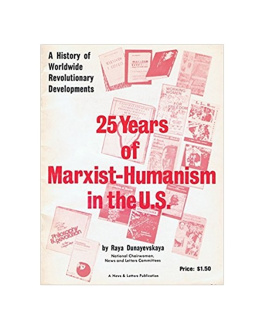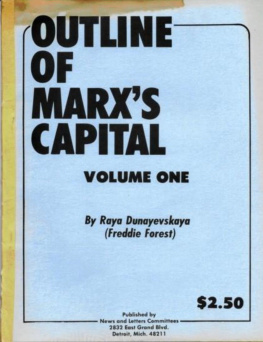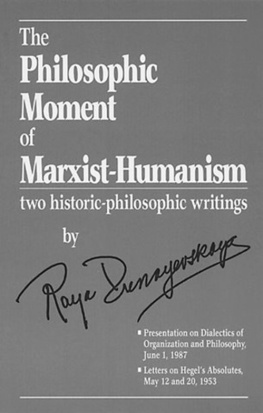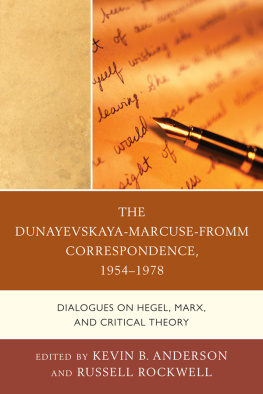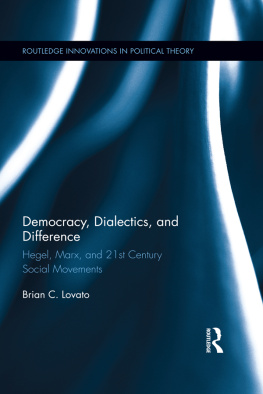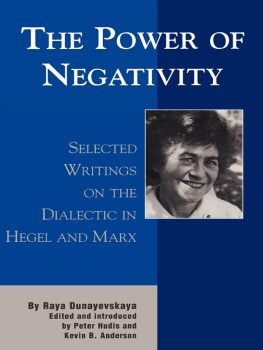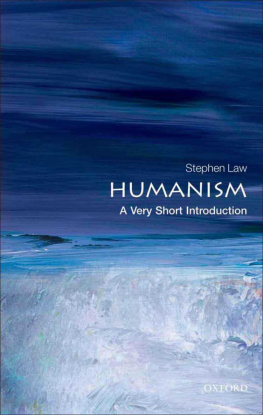Raya Dunayevskaya - 25 Years of Marxist-Humanism in the U.S.
Here you can read online Raya Dunayevskaya - 25 Years of Marxist-Humanism in the U.S. full text of the book (entire story) in english for free. Download pdf and epub, get meaning, cover and reviews about this ebook. year: 2020, genre: Politics. Description of the work, (preface) as well as reviews are available. Best literature library LitArk.com created for fans of good reading and offers a wide selection of genres:
Romance novel
Science fiction
Adventure
Detective
Science
History
Home and family
Prose
Art
Politics
Computer
Non-fiction
Religion
Business
Children
Humor
Choose a favorite category and find really read worthwhile books. Enjoy immersion in the world of imagination, feel the emotions of the characters or learn something new for yourself, make an fascinating discovery.
- Book:25 Years of Marxist-Humanism in the U.S.
- Author:
- Genre:
- Year:2020
- Rating:3 / 5
- Favourites:Add to favourites
- Your mark:
- 60
- 1
- 2
- 3
- 4
- 5
25 Years of Marxist-Humanism in the U.S.: summary, description and annotation
We offer to read an annotation, description, summary or preface (depends on what the author of the book "25 Years of Marxist-Humanism in the U.S." wrote himself). If you haven't found the necessary information about the book — write in the comments, we will try to find it.
25 Years of Marxist-Humanism in the U.S. — read online for free the complete book (whole text) full work
Below is the text of the book, divided by pages. System saving the place of the last page read, allows you to conveniently read the book "25 Years of Marxist-Humanism in the U.S." online for free, without having to search again every time where you left off. Put a bookmark, and you can go to the page where you finished reading at any time.
Font size:
Interval:
Bookmark:
25 Years of Marxist-Humanism in the U.S.
Raya Dunayevskaya
Ever since I began preparing for the celebration of May 5 as the birth-time of history - Marx's new continent of thought - I have been rethinking the birth of Marxist-Humanism in the U.S. There was no way to sum up 25 years of the birth and development of the News and Letters Committees as well as News & Letters as paper, without taking account of the philosophic breakthrough on the Absolute Idea as containing a movement from practice as well as from theory. That occurred in 1953. Once the split in the State-Capitalist Tendency, known as Johnson-Forest, was complete in 1955, our very first publication reproduced my May 12-20, 1953 Letters on the Absolute Idea along with the first English translation of Lenin's Philosophic Notebooks.
In a word, while 1955 saw the birth of News and Letters, both as Committees and as our paper, 1953 saw at one and the same time, the emergence, in the Johnson-Forest Tendency, of open divergencies towards objective events (be it Stalin's death, the East German revolt, the Beria purge, or McCarthyism), as well as towards the subjective idea of what type of paper Correspondence was to be and what was its relationship to Marxism.
* * *
In reaching back to 1953, a new illumination disclosed that we were really talking, not about a, single year, but about the period 1949-1954. After all, nothing short of the Second Industrial Revolution had emerged with the introduction of Automation in the mines. The actual word, Automation, was not invented until five years later during the wildcats in auto in Detroit. The truth, however, is that Automation did initiate a new stage in Industrial production.
And since our age refuses to keep the objective and the subjective in totally separate compartments, it was during that period that I was working on three things at one and the same time: 1) I was active in the Miners' General Strike of 1949-50 during the day and evening; 2) Late at night I was translating Lenin's Abstract of Hegel's Science of Logic, sending these translations with covering letters to Johnson; 3) I was working on a book on "Marxism and State-Capitalism". These three activities led to a three-way correspondence between myself, Johnson, and Lee (Grace Lee Boggs).
Furthermore, insofar as the year 1953 is concerned, something new has just emerged in re-examining that year. Although we had long ago known that Lee and I had totally different analyses of the March 5th death of Stalin and what we were to do about it, it is only now that I can see the link that connects those differences in 1953 to the period, 1949-51. Because philosophic beginnings, the native ground for Marxist-Humanism which emerged in 1949, didn't become manifest until 1953, and because the Letters, in turn, contained what politically didn't come to fruition until the actual split of the Johnson-Forest Tendency in 1955 (at which time they were first mimeographed). It is necessary to begin at the beginning in 1949-51.
* * *
IT IS IMPORTANT that we look at the new stage of production, Automation, and the-form of the workers' revolt against it - the 1949-50 Miners' General Strike - in the same way as, in 1953, we looked at the first revolt against state-capitalism and its work-norms in East Berlin. The point is that both stages of production and both forms of revolt were every bit as crucial for the re-emergence of Marx's Humanism in our age, as had been the outbreak of World War II for the birth of the State-Capitalist Tendency. To grasp the divide within the State-Capitalist Tendency as it grappled with the Hegelian dialectic and the historic re-birth of Marx's Humanism, it is necessary to look at the three-way correspondence on Lenin's Abstract of Hegel's Science of Logic as Lenin grappled with the Hegelian dialectic at the outbreak of World War I. Let's follow the sequence of letters that accompanied the various sections of Lenin's work I was sending to Johnson and Lee.
On Feb, 18, 1949 I sent the translation of Lenin's notes on the Doctrine of Being. The covering note refers to the "Notes on the Dialectic" Johnson had written in 1948, which had then impressed me very much, but which in 1949 made me call attention to the fact that Johnson "practically skipped over the first book". The same note focused on Lenin's new appreciation of the "self-development of the concept", no matter how "Idealistic" that sounds. Lenin had written: "Hegel analyzes concepts which usually appear dead and he shows that there is movement in them. The finite? That means movement has come to an end! Something? That means not what Other is. Being in general? That means such indeterminateness that Being=Not-Being... ".
It is with this new appreciation I felt for Lenin's Philosophic Notebooks that a philosophic division started to emerge between the two founders of the State-Capitalist Tendency - Johnson and Forest. My letters to Johnson continued all the way to June 10 before I ever got an acknowledgement of the receipt of any part of the translation. The silence did not stop me from continuing either with the translation or the covering notes.
Thus, on Feb. 25, I sent him a translation of Lenin's notes on the Doctrine of Essence, singling out three new points for a "historical materialist" to be concerned with: 1) Suddenly Lenin was emphasizing very strongly the 'sequence of dates of publication which showed Hegel's Logic (1813) to have preceded Marx's Communist Manifesto (1847), and that to have preceded Darwin's Origin of the Species (1859); 2) Furthermore, Lenin was now emphasizing the genius of Hegel's appreciation, not just of Essence but also of Appearance as against the Kantian impenetrability of the "thing-in-itself": 3) Lenin was breaking fully with his previous stress on the theory of the primacy of "Causality", now seeing that what is cause becomes what is effect, and vice versa. Instead, he was stressing totality, insisting that: "totality, wholeness, is richer than law". At that point he was underlining the language of certain "definitions" of totality by Hegel, such as "sundered completeness", and the definition of Identity as "separated difference".
* * *
WHEN, ON MARCH 12, I concluded the translation of Lenin's work and sent Johnson the section on the Doctrine of the Notion, my covering note for it no doubt shocked him: "Let me say at the start that although you have entered into this 'conspiracy' with Lenin, the outstanding difference between the two versions (of the Dialectic) is striking. You will note that Lenin's notes on the Notion are as lengthy as those on the Introduction, and Doctrines or Being and Essence combined... although you spent that much time on Notion, and included its practice, the thing you chose most to stop at and say: hic Rhodus, hic salta to was the Law of Contradiction in Essence... (but Lenin) chooses to single out the section on the Idea".
I concluded that Lenin no longer "feared" the Absolute, seeing it both as unity of theoretical and practical idea, as the method of absolute cognition, and as criticism of all Marxists, including himself. Here is how Lenin had put it: "Aphorism: Marxists criticized the Kantians and Humists at the beginning of the 20th century more in the Feuerbachian (and Buchnerian) than in a Hegelian manner".
Contrast this to what Johnson and Lee drew from my translation when they discussed it between themselves on May 27: "Previous to 1914 the whole revolutionary movement, the Second International and all the rest or them, were essentially in the Realm of Being. Even Lenin before 1914 was not very conscious of Essence, although the objective situation in Russia drove him to the Logic. The key to Lenin's notes on Logic is this relation to Essence. We today have not only to do Essence, but also Notion, the dialectic of the party". Lenin, they claimed, "is more concerned with self-movement than he is with Notion".
Next pageFont size:
Interval:
Bookmark:
Similar books «25 Years of Marxist-Humanism in the U.S.»
Look at similar books to 25 Years of Marxist-Humanism in the U.S.. We have selected literature similar in name and meaning in the hope of providing readers with more options to find new, interesting, not yet read works.
Discussion, reviews of the book 25 Years of Marxist-Humanism in the U.S. and just readers' own opinions. Leave your comments, write what you think about the work, its meaning or the main characters. Specify what exactly you liked and what you didn't like, and why you think so.

